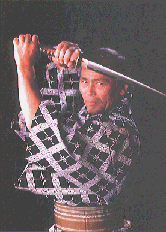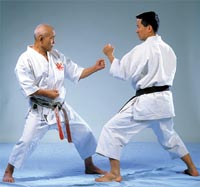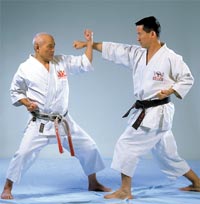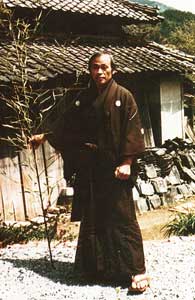|
|||
|
| -Countries |
| -Dictionary |
| -Federations |
| -M.A. Timeline |
| -Number System |
| -Styles |
| -Weapons |
| -Who's Who |
| -Updates |
| -Credits |
| -Stats |
| -Webmaster |
| Soke Takayuki Kubota
Born in Kumamoto, Japan, Takayuki Kubota began studying martial
arts at the age of four under the direction of his father, Denjiro
Kubota. Because of his insatiable desire to learn every aspect
of the arts, he trained daily and studied several different
styles of martial arts. Despite his restrictive scholastic program
and grueling training schedules, he managed to complement his
martial arts training with additional studies in meditation,
history and other non combative aspects of the arts. He distinguished
himself by earning advanced instructor ratings in Judo, Aikido,
Kendo, Iaido and meditation as well as calligraphy and several
other arts. Grand Master Kubota began his teaching career at
the age of 14 and it has flourished ever since. At age eighteen
he opened his first dojo in Tokyo. He has taught police techniques
for over 35 years from simple handcuffing to the world famous
baton and An American citizen since 1974, Grand Master Kubota devotes much of his time to teaching karate at his school in Glendale, California. Although he is well known for having been an instructor to some of the most prominent members of our society, he is most sincerely interested in the development of karate at all levels and has placed a special emphasis on teaching young people. Respect and discipline are two of the primary concepts stressed in all children's classes resulting in proper growth and the continuation of the art. In addition to his many other activities, Grand Master Kubota has written several books on the martial arts. His published works include Action Kubotan, The Art of Karate, Gosoku-Ryu Karate, Weapons Kumite and others. He has also produced a number of video tapes on the art. Takayuki Kubota is also an actor who has appeared in over 300 movies, television shows and commercials. The Mechanic, Killer Elite, Blue Thunder, Simon & Simon, Black Rain, Rising Sun and The Hunted are listed among his numerous acting credits.
Grandmaster Kubota interview from doshinmartialarts.com DOSHIN: When did you start your martial arts training? Soke: My father was probably my first instructor. He liked kendo
a lot. He taught me the basics of judo when I was very young...no
gi, just with the obi (belt). During the time of the second World War, two soldiers were stationed in our village. Each town was supposed to take care of a few soldiers to support the effort. We didn't have too much to share but we did manage to give them the basics...food, shelter. In exchange, they taught us the basics of To-Te. One was Terada, the other was Tokunaga. I don't think they were masters or anything like that. They simply showed us the basics, tsuki and some keri. I remember one day they were showing us how to hold sharp rocks in our fists to make a "stronger" tsuki. I was only 5 or so...they told me to get a long, sharp rock so it would be like a knife. The training was very, very basic...mainly punching and striking. They didn't show us too many kicks. I continued training on my own. I began to do my own kind of meditation. I was only 5 or 6...my mother must have thought I was crazy. I would disappear during the night and go out to the woods, up in the mountainous area behind our home and meditate. I wouldn't chant or anything like that...just concentrate. DOSHIN: What did you do after the war ended? Soke: I got it into my head to go to Tokyo. I am not really sure why...I just felt that was the thing to do. My parents were concerned. After all, I was pretty young, 13 or 14...I was just a country kid. But my mother told me that if this was my choice then go...but I couldn't come back. There would be no turning back. I look back on it now and realize that this sort of thing helped to shape my thinking. You make a choice...you commit to that decision and follow through with 100% of your efforts. It helped to make me a better martial artist...a stronger person. DOSHIN: That must have been quite a trip to Tokyo! SOKE: My father gave some money to the conductor to sort of slip me on board. My family gave me a little money, some food for the journey, and wished me luck. One of my brothers went with me as far as the end of Kyushu. After that, I was basically on my own. I was so..."train sick"...I had never been on one before. I still remember the whole trip...nothing but nausea! DOSHIN: Did you know anyone there? Soke: My father had written to a friend and asked him to sort of look out for me. I remember standing in what was Tokyo station...looking for someone I had never met! Anyway...we finally found each other after a lot of puzzled looks. He took me to his "house"...it was more of a shack! You have to remember the time...no one really had a whole lot of anything. He shared his home, his food. DOSHIN: What was Tokyo like back then? Soke: After the war, it was a mess. American soldiers were everywhere. I don't remember too many Japanese buildings but I remember the "kamaboko"...American Quonset huts seemed to be all around. I remember standing in line for food. Some companies would try to help out by donating things...day old bread or similar things. I used to get up at 3 or 4 in the morning to try to get a good spot in this one line...bread, I think. But the company was trying to help families first. They were giving out these coupons to the local families. My family was back in Kumamoto so I didn't have any coupon. No coupon, no bread. I could understand. Back then, there were some people who tried to take advantage. But,I kept going back again and again. Finally, they figured out my situation and gave me some bread. Things were still pretty confusing. A lot of people were basically homeless...just walking around...trying to survive. DOSHIN: Were you training? Soke: Of course! No matter what...I always found time to train. Still
just the basics but I always trained. DOSHIN: How did you get involved with the police over there? Soke: I was in the area around one of the Koban (local police station) when an altercation broke out. I kind of "helped out" the officers. At that time I met a detective named Karino. I still speak to him to this day. Karino took me under his wing and helped me a great deal. He took me to my first real dojo or training hall. There was this Chinese martial artist...Tsai. He had this school of sorts. I watched him for hours. I think now that I probably began picking up some of my ideas about circular movement from Tsai. DOSHIN: Karino also helped with your now famous baton techniques, didn't he? Soke: He helped me to get them noticed by the right people back then. I had been studying and training with a baton or short stick for many years by then. There were always sticks around. It seemed a pretty natural weapon. I think maybe Terada or my father may have shown me the basics. I just sort of took it from there...working it into my own style. Karino introduced me to people who liked my approach to martial arts. From that, I got to share my ideas with more police. This helped me to improve my own art. I did a lot of research...how do you say...on the job! DOSHIN: You were always trying to learn more about the martial arts? Soke: Yes, through friends like Karino I met other martial artists. Not just karate people...wrestlers, aikido, judo...every kind. It was a very interesting time. I met Mr. Toyama of the Shudokan and began to look at his ideas and methods. I watched the kata...I didn't really train with his students...I just watched and learned. DOSHIN: You also met Mr.Konishi of the Ryobu-Kai during that time? Soke: Yes, I was introduced to Mr. Konishi through some mutual friend. He invited me to his class. It was the same thing as with Mr. Toyama. I would watch the classes and just pick things up. I liked this technique or that idea. I would go back to my own training and try it out. I kept in touch with Mr. Konishi over the years. He would drop by my dojo in Los Angeles sometimes. DOSHIN: You also watched wrestlers? Soke: Yes, but these were not the kind that you watch these days. Most of them were pretty tough. I had a particular favorite...Rikki Dozan. He was very big back then. People would crowd around the few televisions and watch his matches. I always wanted to meet him. My friends would tell me that I was crazy...he was a big star. I finally got the chance one day though his bodyguard tried to step in. He probably thought I was crazy! Anyway, we got to talking and hit it off. We would talk for hours about training and martial arts. Through him, I met Mas Oyama and others. DOSHIN: What was Oyama like? Soke: Mr. Oyama was as crazy about the martial arts as I was so we got along pretty well. DOSHIN: He used your hand in one of his books, I believe. Soke: Yes, We used to trade ideas on conditioning and hitting the makiwara and such. One day he tells me that he wants to use my hand in a karate book. I didn't know what to think but I agreed. So, in one of his Kyokushinkai books, there is a picture of my hand as an example. DOSHIN: You also spent some time as a bodyguard to Edwin Reischauer, the American ambassador? Soke: I met him through another mutual friend one day. He was a good man. He did a great deal in those early years to help America and Japan get along. Through Mr. Reischauer and his wife, I got my first real exposure to the American culture and people. DOSHIN: You also said once that it helped your evolution as a martial artist, how so? Soke: My evolution as a martial artist is an on going thing. I am always trying to get better. What my experiences with the Ambassador helped to do was get me thinking about the difficulties of dealing with different cultures. When I am working with law enforcement personnel, I have to always remember who these people are...what is their culture...what is and is not acceptable. A technique that you don't think twice about in Japan may be a very serious problem in America or France or whever. It all depends upon the circumstances. DOSHIN: Can you elaborate? Soke: One of the first things I do when I go to train law enforcement people is ask what the rules are. "Just tell me the rules!", I say. I can then decide what sort of technique is appropriate for that specific agency. A lot of the people out there who think they can train police don't take that into consideration. DOSHIN: That is something you try to point out in your books, I believe. Soke: Yes, there is no one technique that is going to work in every situation. Every situation is unique. There are just too many variables. The size factor alone can change everything. It used to be that police were all big men. Now, the officer can be small, tall, whatever. You have to adjust the technique. In the Close Encounter book, I tried to show some of the various levels of force possible. I want martial artists and people to realize that this is a complicated situation. You have to have every level available to you. Control techniques, power techniques...everything. It is not just police. There are situations on the street where you don't want to punch someone. It is not appropriate. Then, you need to know some control technique. DOSHIN: Lately, the police have been having some problems with these sort of issues. Do you have any opinions? Soke: Being a police officer in America is one of the most difficult jobs imaginable. The things that can be common here have an effect on a situation. The officer has to be concerned about a weapon, pain killing drugs, and other similar issues. These things are not as common in other cultures. Police everywhere need more training. That would include everthing
from more consistent martial arts training to counseling skills...you
know...people skills, just trying to talk. But people always
have to remember that there will be situations when an officer
has to defend himself or some innocent bystander.
Soke Takayuki Kubota can be reached at this address:
|

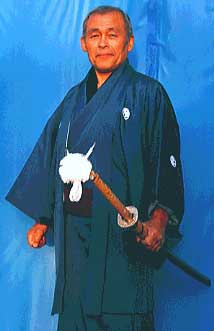
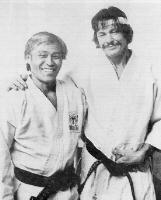 Kubotan
techniques. He has taught at 34 law enforcement agencies all
over the world including the Tokyo and Los Angeles police departments,
the FBI, and the California Highway patrol.
Kubotan
techniques. He has taught at 34 law enforcement agencies all
over the world including the Tokyo and Los Angeles police departments,
the FBI, and the California Highway patrol. 